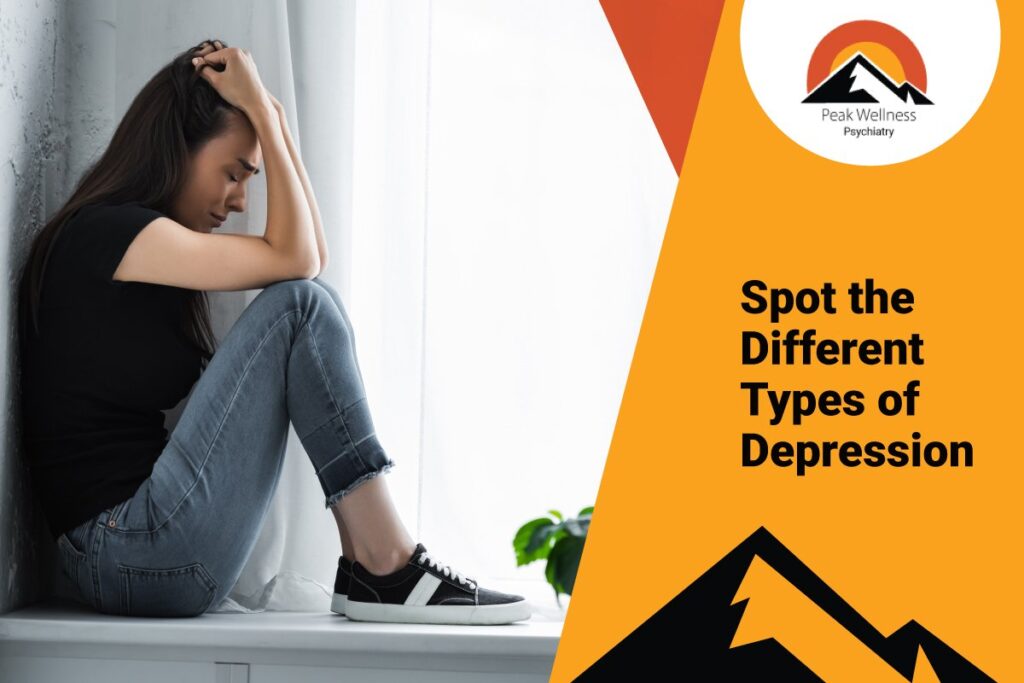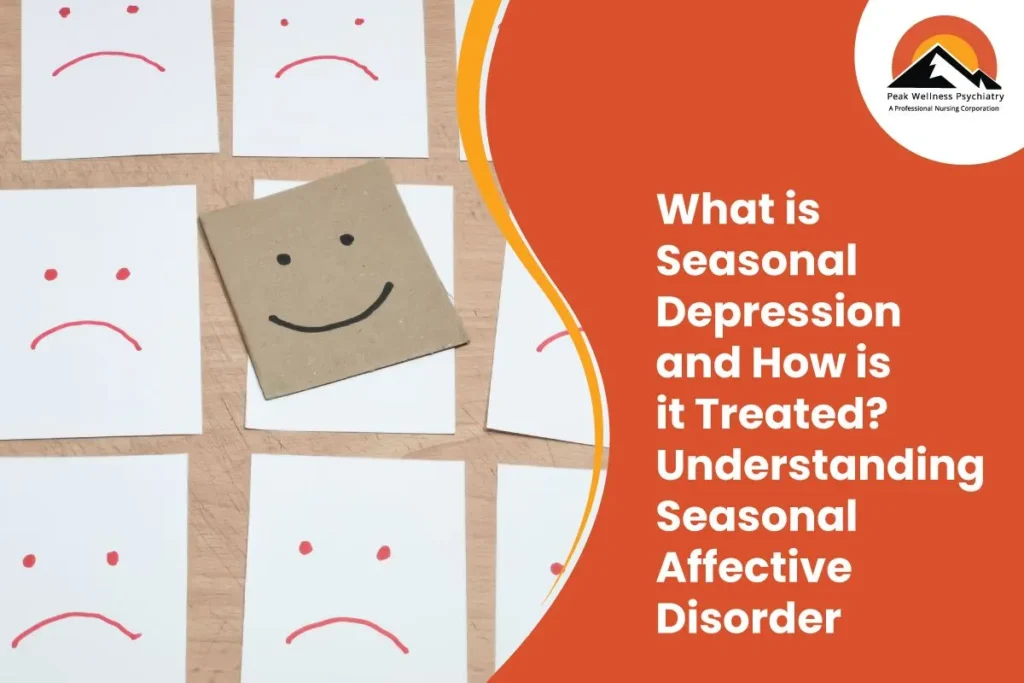What is Depression
Depression is a medical condition that influences how you feel. It can also affect your productivity and your relationships.
When there is an issue within our body, were used to doctors conducting blood tests and other complicated lab tests to diagnose the illness. Most lab testing for depression isn’t helpful. The medical professional’s most important diagnostic tool will be talking to the patient to screen for specific symptoms of depression. Health professionals can do this with one-on-one meetings where a set of questions are asked, or a series of questions are provided to the patient via their patient portal for them to take on their own time.
It is essential to note that depression diagnosis can be difficult or require a series of screenings or observations. Due to certain types of depression can be displayed in many different ways.
How to Spot the Different Types of Depression
Everyone experiences moments of sadness and grief. However, feeling very sad for more than two weeks and not being able to do things may be a sign of depression.
Most importantly, depression comes in many forms. Even though these types have some symptoms in common, they are also different in significant ways. We can spot the different types of depression through their symptoms.
The following types of depression are examined and how they impact individuals.
1. Major Depression
Major depression, also known as Clinical Depression, is a common condition that keeps returning. It is characterized by an all-consuming lousy mood and a loss of interest in joyful activities.
You can spot Major Depression among these symptoms:
- Sadness, emptiness, or hopelessness
- Anxiety, restlessness
- Thinking, speaking or moving slowly
- Loss of enjoyment or interest in sex, hobbies, or sports
- Sleeping too much or too little
- Fatigue and low energy make even little chores difficult.
- Reduced appetite, weight loss, or increased food cravings.
Psychotherapy and medicine are commonly used. Electroconvulsive therapy (ECT) may help some people. However, with this severe depression, a patient may be treatment-resistant.
2. Persistent Depressive Disorder (PDD)
It is previously called “dysthymia.” At least two years of low mood qualify as this type of depression. However, it may not be as bad as major depression.
Some of the symptoms of PDD are:
- Avoiding social activities
- Guilty feelings and worries about the past
- Lack of appetite or eating too much
- Sleep problems
- Loss of interest in day-to-day things
- Sadness, feeling empty or being sad.
- Hopelessness
- Tired and not having enough energy
- Low self-esteem, self-criticism, or feeling like you can’t do anything.
There are different types of treatment for PDD. Nevertheless, medication and psychotherapy are typically used for treatment.
- Doctors may suggest different types of antidepressants to treat PDD.
- The most effective way to treat PDD is with a combination of medicine and therapy.
- Most of the time, doctors suggest you try psychotherapy or cognitive-behavioral therapy (CBT).
- Psychotherapy, sometimes called “talk therapy,” is usually done with the help of mental health professional. These things can happen in person, over the phone, or via video call. You can also meet with other people in groups.
3. Bipolar Disorder
Bipolar disorder, formerly called manic-depressive sickness, causes depression. Patients symptoms include:
- Grandiose ideas
- Unreasonably high self-esteem
- Decreased need for sleep
- Faster thoughts and activity
- Increased pursuit of pleasure, including sex sprees, overspending,
- Risk-taking
Although being manic can feel wonderful, it rarely lasts for long. This can result in destructive conduct and is typically followed by a depressive episode.
Bipolar disorder is a lifelong condition. Treatment includes symptom management and the following options:
- Medications: Taking drugs to manage your moods is often necessary.
- Continued treatment: Even when feeling better, bipolar disorder requires lifetime medication.
- Day therapy programs: Your doctor may suggest day treatment. These programs offer assistance and counseling as you manage symptoms.
- Substance abuse treatment: You need rehab if you abuse alcohol or drugs.
- Hospitalization. If you’re dangerous, suicidal, or detached from reality, your doctor may prescribe hospitalization (psychotic).
4. Seasonal Affective Disorder (SAD)
When the days end quickly in the fall and winter, this depression can set in. The change in mood could be caused by changes in the body’s natural daily rhythms, how sensitive the eyes are to light, or how chemicals like serotonin and melatonin work.
Some symptoms of SAD are:
- Having trouble sleeping too much
- Having cravings for carbs, overeating, and gaining weight
- Having trouble paying attention
- feeling worthless, hopeless, or guilty
- feeling like you don’t want to live
- Not having much energy and feeling tired
Light therapy is the most efficient treatment, which involves sitting close to a very bright light source daily. Psychotherapy and medication often used to treat depression may also help.
5. Psychotic Depression
People who suffer from psychotic sadness also experience “psychotic” symptoms, such as
- Hallucinations (the perception of unreal sounds or images)
- Having delusions or wrong assumptions,
- Paranoia (perceptions that others are trying to harm you)
Antidepressant and antipsychotic medications can be used in conjunction to treat psychotic depression. ECT might also be a choice.
6. Peripartum (Postpartum) Depression
Women experiencing serious depression in the weeks and months following childbirth may be suffering from peripartum depression.
Symptoms of postpartum depression include
- Loss of interest in once-enjoyed pastimes.
- Not eating or losing appetite.
- Having less energy and drive.
- Have trouble sleeping or always want to sleep.
- Unreasonable or excessive crying.
- Poor thinking or concentration.
- Feeling on edge or worrying too much.
Antidepressants can also help in the same way that they help treat major depression that isn’t caused by giving birth.
7. Premenstrual Dysphoric Disorder (PMDD)
With PMDD, women experience depression and other symptoms when their period starts.
In addition to being depressed, you might also have the following symptoms:
- Irritability
- Anxiety
- Mood changes
- difficulty concentrating
- Fatigue
- feeling too much at once,
- altered eating or sleeping patterns
PMDD can be treated with antidepressants or occasionally with oral contraceptives.
Effects of Depression on Daily Life
Our physical and mental health are interconnected. This is evident in recent studies showing COVID-19 isolation and increasing depression rates—the relationship between psychological and physical work both ways. Depression can cause an individual to physically and socially isolate themselves, leading to health consequences.
Research shows that social isolation increases the risk of stroke and coronary heart disease. Physical deficiencies in exercise can lead to many health problems for individuals. A recent study showed that These effects tell us that depression treatment is essential and valuable in helping someone regain enjoyment in their life. However, treating depression is more than advice such as, “Go on vacation” or even “Pull yourself together.”
Reactivating wounds and trauma, such as war experiences, sexual abuse, and physical and mental injuries, is unbearable for some to recall. Losing a loved one or friend can also leave intense sadness and desolation. Many would rather repress painful experiences and not address how this affects their physical and mental health.
Depression doe not discriminate by race or age. People can experience depression at any age, from infancy to old age. There are different levels of depression. Those affected often find it hard to acknowledge when they need assistance.
How to Manage Depression?
When afflicted with depression, you can take a new stand in your life and manage your therapy in ways that go beyond medication. Find ways to change your lifestyle to cope with stress and boost your sense of self-awareness regarding changes in mood and behaviors.
- Care for your body. Get sufficient sleep, eat right, and work out often.
- Stick to your treatment plan and allow time for therapies to work.
- Take advantage of therapy. Be vocal. Tell your doctor what works and what doesn’t for you.
- Don’t drink or do drugs for fun. You might think that these help you feel better. But they can make it harder for you to get better from your depression.
- Try yoga and meditation to help you deal with stress.
- Spend time with your friends and family. You can join a support group. Pay attention to what seems to make your symptoms worse. Don’t make important life choices when you’re feeling bad.
Consult With The Right Specialist
At Peak Wellness Psychiatry, we acknowledge that anyone can experience depression. Nevertheless, if you are seeking online psychiatry services. You can speak with us via our Telepsychiatry service in the comfort of your home or office.
Should you decide on an online psychiatrist NP to help you, look no further! At Peak Wellness Psychiatry, we offer telemedicine to all California, Arizona, and Washington patients. We also accept a variety of insurances and offer convenient online prescriptions for depression.
Depression is treatable and you can get better. It will be our pleasure to assist you in receiving treatment. Call (888) 909-8676 to make an appointment or select the highlighted link. click the above-highlighted name of our clinic.




